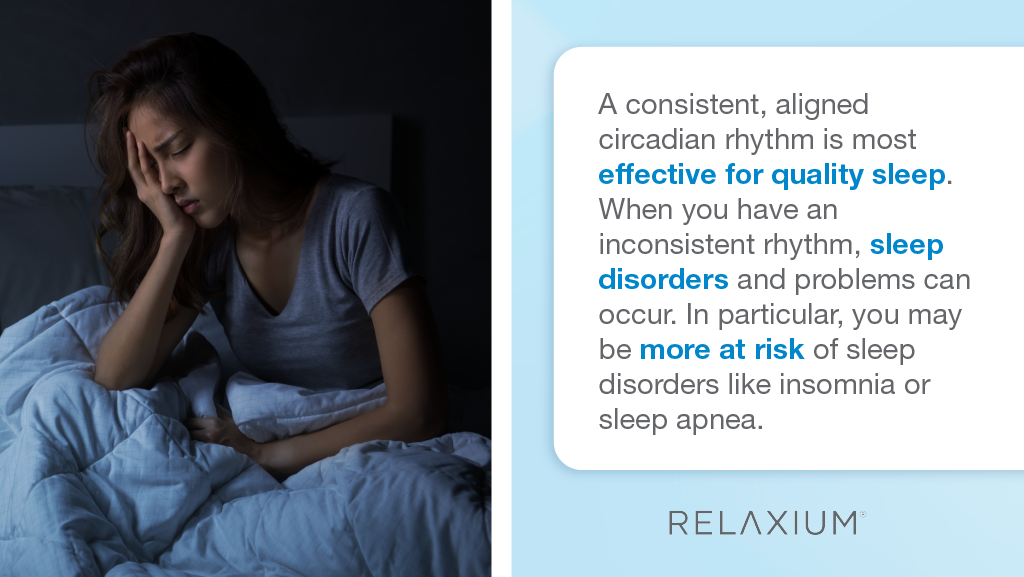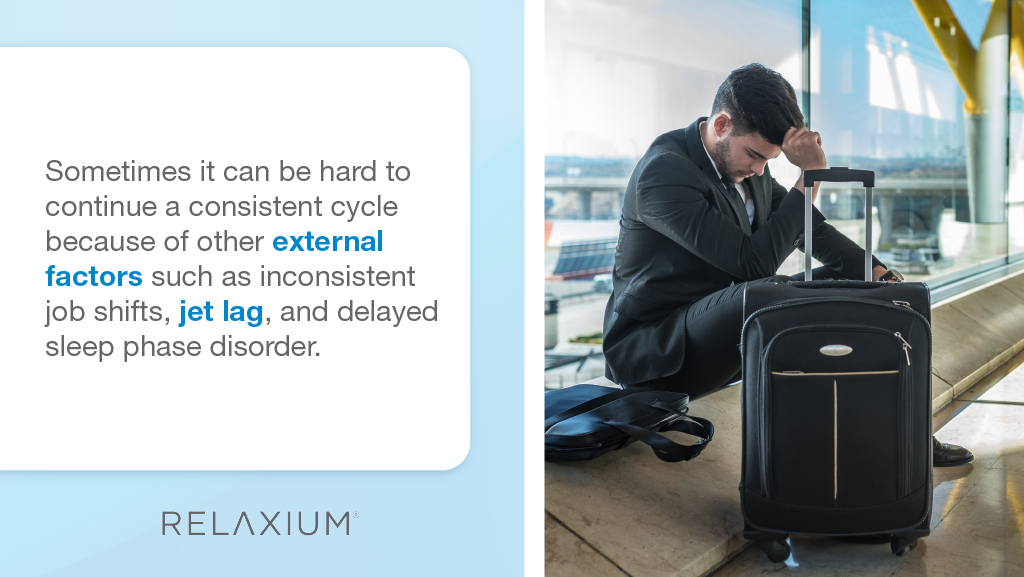Something everyone hears about but many are not fully aware of; our circadian rhythm cycle is what ensures adequate amounts of sleep. As we know, we need sleep to survive.
You can think of circadian rhythms as an internal clock. It is the pattern our body follows when trying to function from day to day. At Relaxium, we are of course most concerned with the circadian rhythms sleep-wake cycle.
What exactly is the Circadian Rhythm
As we previously defined, a circadian rhythm is a 24-hour internal clock that develops a pattern for each individual. Once the brain has created its specific pattern, the body then adjusts and follows. When the pattern is disrupted or changed, it can throw things off, i.e. your concentration, sleep habits, and mood.
History of Circadian Rhythm
The circadian rhythm cycle was labeled and discovered by French astronomer Jean Jacques d’Ortous de Mairan. The logic behind his experiment was to place a mimosa plant in a light-tight dark room. He noted that the plant would unfold its leaves in the morning and then close them in the evening.
A couple hundred years later, German biologist Erwin Bünning understood that the bean plant leaf movement had a period of 24.4, not 24 hours. That conclusion led to the realization that plant photoperiodism is controlled by an endogenous aka internal clock, synchronized by external stimuli.
It was then called circadian rhythm because the term circa diem in Latin means “around a day.”

Why is it important to have a consistent Circadian Rhythm
A consistent, aligned circadian rhythm is most effective for quality sleep. When you have an inconsistent rhythm, sleep disorders and problems can occur. In particular, you may be more at risk of sleep disorders like insomnia or sleep apnea.
Insomnia is a sleep disorder in which a person will struggle to fall asleep, and if woken, to fall back asleep. Not only does it affect your sleep habits and relaxation, but it also affects energy. Often a person with insomnia will wake up to start the day and continue to feel tired. In turn, this lack of natural sleep starts to affect their daily schedule and livelihood.
Sleep apnea is a sleep disorder where breathing is consistently affected. The act of breathing is continuously starting and then pausing.
Due to the fact that sleep impacts both physical and mental health as well, with a disorganized circadian rhythm, your physical and mental well-being can be toyed with. This then affects your mood which can impact your entire day.
The NIH (National Institute of Health) concluded through a study that an unbalanced circadian rhythm is “profound and include myriad metabolic ramifications, some of which may be compounded by adverse effects on dietary choices…If not addressed, the deleterious effects such as disruption will continue to cause widespread health problems…”

How Circadian Rhythm affects sleep
As stated before, as far as sleep and the circadian rhythm cycle are concerned, the sleep-wake cycle is defined.
When light is presented, alertness and awakening tend to come together. After a full day of activity and movement, our bodies naturally produce melatonin, a sleep hormone which is what makes us tired during the night.
Naturally, if this pattern is consistently changing then it is hard for the body to continue the typical cycle. This will make falling asleep much more difficult.
Sometimes it can be hard to continue a consistent cycle because of other external factors. Just to name a few:
- Inconsistent job shifts
- Jet lag
- Delayed sleep phase disorder (night owls)
How to maintain a good circadian rhythm
There are many different ways you can try to maintain a good circadian rhythm cycle. Prioritize your sleep hygiene by doing the following:
- Exercise as much as possible: When you exercise daily your body is put through so much physical activity that you will naturally feel more tired later in the day.
- Try to keep a consistent sleep schedule: Waking up and falling asleep at the same time every day will help to promote a consistent sleep schedule which over time your body will naturally associate a specific time with sleep.
- Get some sunlight: Natural light helps the circadian rhythm cycle. This is why daylight savings makes people more groggy and exhausted earlier than they usually do.
- Put the caffeine down: Caffeine promotes alertness. If you consume caffeine regularly, especially later at night it prohibits deep sleep.
- Avoid long naps: If you take long naps during the day, the natural tiredness that occurs at night will be much less profound.
- Keep the technology away at bedtime: The presence of blue light/technology does nothing for the body when it comes time to sleep. Activation in your brain makes relaxation much harder.
- Consider a sleep supplement: Here at Relaxium we have a sleep supplement called Relaxium Sleep. It is designed to help you fall asleep faster, stay asleep longer, and wake up feeling refreshed and focused.
All of these tips will make falling asleep much easier. It can be difficult to keep to a pattern like this given how stressful and long days can get but if you are struggling with sleep these tips will help.

A good circadian rhythm leads to the best sleep
Overall understanding the purpose of the circadian rhythm and why it is important can help to motivate you to make the best choices for your health. This is especially great when needing a solution for a lack of quality sleep. We hope you take this advice and make the changes necessary to better yourself and your sleeping habits.
To restful and healthy days ahead.
The Relaxium Team
*These statements have not been evaluated by the Food & Drug Administration. This product is not intended to diagnose, treat, cure, or prevent any disease.
Sources:
https://www.nhlbi.nih.gov/education/dash-eating-plan

